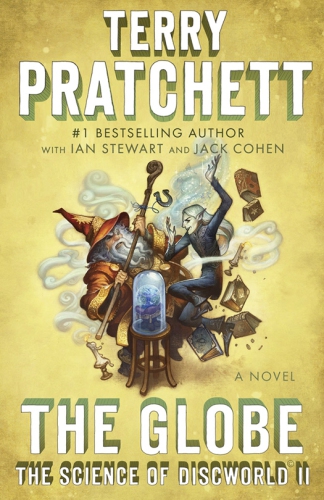
The Globe
Science of Discworld Series, Book 2
کتاب های مرتبط
- اطلاعات
- نقد و بررسی
- دیدگاه کاربران
نقد و بررسی

February 2, 2015
Pratchett and company return with another lively mix of science fact interwoven with wry fantasy world-building in this sequel to The Science of Discworld. When the wizards of Discworld's Unseen University accidentally created Roundworldâa version of our own Earthâthey were so busy arguing about how the new universe worked that they didn't pay much attention to the people living in it. Now they're trying to make sense of these humans who don't have any magic but still believe in it, and somehow never manage to advance enough to keep themselves from getting wiped out by catastrophes such as asteroid impacts. The authors focus on the inner space of the human mindâthe mental models we create, or "stories" we tell ourselves to explain the worldâand how these stories shape our understanding of it. The discussion covers a broad array of topics and concepts, including Free Will, religious belief, the Anthropic Principle, entropy, and the necessity of Art in human development. This thoughtful, accessible, and sardonic look at the softer side of human evolution will convince readers of the power of a good story behind any endeavor.

November 15, 2014
This sequel to the fantasy/nonfiction hybrid The Science of Discworld (2014; U.K. 1999), wherein the bumbling wizards of Discworld's Unseen University accidentally created our universe and the planet Roundworld, aka Earth, first manifested in the U.K. in 2002.In the first book we learned that the inhabitants of Roundworld will escape the planet via a space elevator before another ice age would have wiped them (us) out. Unfortunately, Roundworld ("It mostly had ice ages, and was less engrossing than an ant farm") has become infested with elves-Pratchett's version being thoroughly nasty creatures like psychic leeches that, if left to themselves, will sap humanity's creativity and drive so that nobody (human, that is) will escape the forthcoming disaster. Thanks to Hex, Discworld's intelligent, magic-powered computer, the wizards can move through time, so they travel back and banish the elves. However, the humans that result are placid, cowlike creatures, incurious and almost devoid of intellect. Somehow, elves are essential to human development. But how? And what to do? In chapters that alternate with Pratchett's tale, Stewart (Mathematics/Univ. of Warwick) and Cohen (Biology and Mathematics/Univ. of Warwick) explore, via physics, biology, literature and a dozen other topics, the role of culture or, more precisely, narrative, in fostering curiosity and intellectual development ("we may indeed share 98 per cent of our genes with chimpanzees, but then, we share 47 per cent with cabbages"). Readers who simply want more Pratchett may begin by skimming the more factual sections, but it will dawn on many that the discussions are at least as fascinating and entertaining as the antics of the wizards. It's baffling why this appealingly distinctive offshoot (there are two volumes still to come) of the wildly popular Discworld yarns took so long to cross the Atlantic.
COPYRIGHT(2014) Kirkus Reviews, ALL RIGHTS RESERVED.

November 15, 2014
This latest foray into Pratchett's steadfastly popular Discworld saga is an updated U.S. reissue of a 2005 British book that includes references to scientific developments that were unknown 10 years ago. Pratchett and collaborators Stewart and Cohen follow the same format as the first installment, The Science of Discworld (2014), alternating between nonfiction chapters about the origins of language, archaeology, and anthropology, among others, with a cleverly constructed story about the elves and wizards of Discworld witnessing the surprising evolutionary changes taking place on Roundworld, that is, Earth. The Discworld narrative here follows attempts by the wizards of Unseen University to stop the devious machinations of evil elves that have invaded Roundworld. One wizardly counter-tactic involves stopping Arthur J. Nightingale from being Roundworld's greatest playwright by substituting him with Shakespeare. Stewart and Cohen's nonfiction sections delve deeply into such topics as linguistics, evolution, and psychology. For Discworld devotees, this volume is, of course, a must acquisition. But anyone interested in literate, well-informed discussions that straddle the lines between philosophy and science will find it fascinating as well.(Reprinted with permission of Booklist, copyright 2014, American Library Association.)

























دیدگاه کاربران